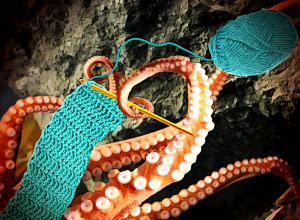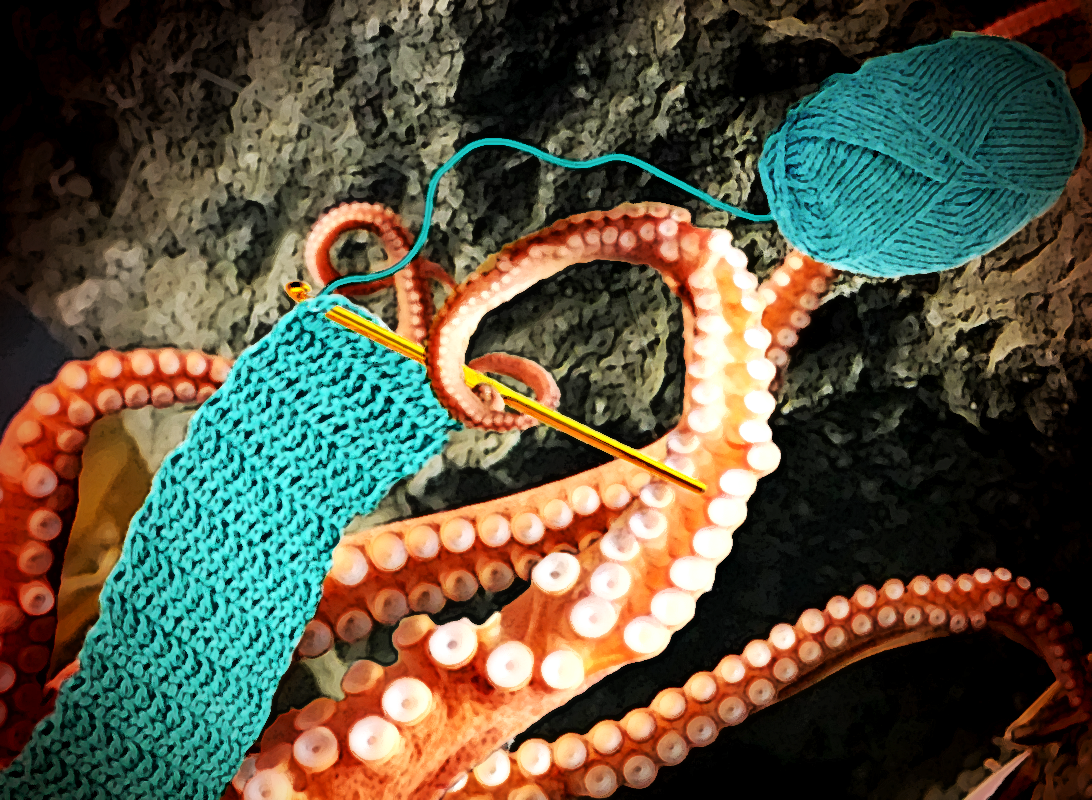A letter by Dr. Elizabeth Chu, as provided by Alanna McFall
Art by Scarlett O’Hairdye
To the most glorious and esteemed Dr. Von Lupe,
Hello, sir, and may I just say it was a pleasure to hear from you in your last missive. Dr. Quinn and I were both honored and delighted, and we both look forward to answering your many, many questions about the progress of our work. Dr. Quinn is writing her own response, but we agreed it would be beneficial for you to get both sides of our story before appropriately distributing praise, blame, or any molecular disintegration that you see fit.
We have been hard at work on the cephalopod intelligence experiments, and each generation of squid, along with the octopi and cuttlefish, have shown accelerated intellectual growth and positive responses to puzzles and tests. We have truly broken new ground in invertebrate biology, and I believe you will find a great deal to be happy with in our work. Were we to declassify our research tomorrow and leave our underground dwelling, we could win a Nobel Prize with ease. Unfortunately, as to your request for hyper-intelligent giant squid (or “kraken,” as I know you prefer them to be called) fit to independently run an underwater base of operations (or “lair”), there is still a great deal of work to be done.
One of our most recurring issues has been in regards to your request that the kraken be able to understand spoken and written English and Russian. While we are able to give the highest performing of our test subjects rudimentary instructions by way of hand signals and color-coded signs, they have yet to respond to written symbols in any alphabet. It is my deepest sorrow to report that all of the squid remain illiterate as of the writing of this letter. I beg your leniency in this matter, sir, as I believe we are scant months (three years, at most) away from bringing our smartest cephalopod to a kindergarten reading level.
But I am happy to report, sir, that not all of my news is contrary to your wishes, and therefore bad. Allow me to recount a quick anecdote of an occurrence that took place a few months ago:
I was taking a brief respite from my work while the latest batch of the intelligence serum distilled. (I assure you that my resting is not a common occurrence, sir. I adore working 18 hour days as a part of your glorious science machine. If anyone in this lab is ever slacking off, it is Dr. Quinn.) I pulled out a small hobby of mine in order to relax my mind, a scarf that I am crocheting. I sat next to one of the large glass cephalopod tanks to work.
After working on my handicraft for some time, I noticed movement in the tank behind me. Several of the cephalopods had gathered against the side of the tank and were watching me. That in and of itself is not unusual, as they are very curious creatures by nature, a trait which has only increased with treatments. But several of the test subjects were grasping lengths of seaweed in their tentacles, along with sticks and other long skinny lengths of plastic from their tank. Upon closer inspection, it appeared that the seaweed had been twisted into lumpy knots.
I raised my scarf in my hands. They held their seaweed between their tentacles. I made a stitch in the scarf by twisting the yarn around my crochet hook. They tried to the best of their abilities to mimic the motion, twisting their seaweed into tangles with the sticks and plastic tubing. After less than an hour of watching me, some of them more or less had the logistics of it down.

I hope that you see the importance of this milestone, sir, and why it was vital for me to spend the last two months teaching all of our squid, octopi, and cuttlefish to crochet. As a scientist, it would have been irresponsible of me not to.
To read the rest of this story, check out the Mad Scientist Journal: Spring 2016 collection.
Dr. Elizabeth Chu is one of the world’s leading experts on invertebrate biology and cephalopod intelligence. Her work with squid and cuttlefish has brought her to international recognition and acclaim, which has made her recent disappearance all the more shocking. Dr. Chu went missing six months ago while on holiday near the Ural Mountains, and investigators have found no clues as to her current whereabouts. Any information regarding the location of Dr. Chu should be brought to the appropriate authorities immediately.
Alanna McFall is an upcoming science fiction and fantasy writer. She has worked in a variety of mediums, from short stories to novels to audio scripts, and across a range of locations, stretching the span of the country from New York to Minnesota to California. She is always looking for ways to expand her repertoire and get involved in her next project. Follow her work on Twitter at @AlannaMcFall, or on her website, alannamcfall.wordpress.com.
Scarlett O’Hairdye is a burlesque performer, producer and artist. To learn more, visit her site at www.scarlettohairdye.com.
“To Dr. Von Lupe, Concerning the Kraken” is © 2016 Alanna McFall.
Art accompanying story is © 2016 Scarlett O’Hairdye.
